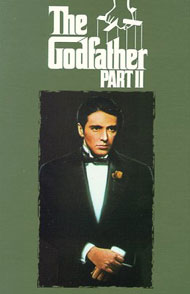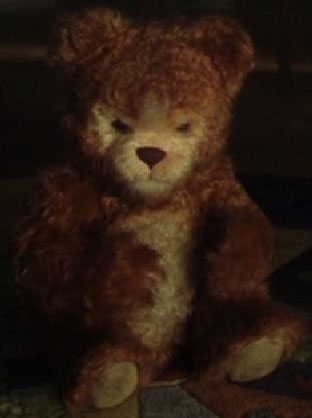
The
Godfather Part II
(1974)

Rated: R
Runtime: 3 Hours and 20 Minutes
Reviewer: Dale
Grade: AI never thought I would find myself saying this, but I really do believe that "The Godfather Part Two" is one of the few sequels that goes above and beyond the call of duty and actually trumps its predecessor. A bold statement, I know, but I really do believe it.
The first "Godfather" did a magnificent job of introducing us to the family business of the Corleones and showing us the rules, regulations, traditions and protocols of a mafia family. It had a truly remarkable story arc, strong characters and a very tight plot. "The Godfather Part Two" expands on the themes and characters of the first film and shows us where the saga goes from there. We know the traditions and all of the rules from the first film. So, with that background evidence, we can appreciate this film all the more. We have a springboard. No time need be wasted on introductions. (Not that there was any time really wasted in the first film, not a single moment). We can jump right into the plot and become absorbed right off the bat.
The film is brilliantly layered, showing us the difficulties that Michael Corleone must overcome as he takes the reigns of the family business and makes the family his own. But then the structure doubles back to show us how his father came to power in the 1920's. It shows us how young Vito Corleone (Robert DeNiro) gains the respect and allegiance necessary to lead the largest crime syndicate in New York and it offers a fascinating glimpse of the said crime syndicate in its infancy. It shows us the meager roots of his power and his well-structured clan, which gives us a deeper appreciation for what Michael is doing with it.
The film is complex, but never confusing. Even with the rather similiar-sounding mafioso names that are being bandied about in the course of the film, we always know what time period we are in, who is being referred to, and what is being done. And none of it is less than fascinating. The first stuff with Pacino is a tad dry, but the film soon takes the stops off and immerses us in its dangerous world. The camera is always placed perfectly, the sets and production are immaculately designed and there are a wealth of details both in the atmosphere and in each of the performances.
Pacino is great. We can see the man we met in the first film maturing and turning evil before our very eyes. We see him changing and it is a little disturbing. In the first film, he was the guy we identified with. He was the audience character, the one we most empathized with and understood. He was the one who wanted no part of the family business and yet was sucked in anyway. In this film, we see him start out with hints of that man within him and then, slowly, through the course of the film, we watch in horror as he becomes something akin to the prince of Darkness. We watch as he alienates those he loves and destroys the very things that make him human. It is remarkable and unsettling all at once.
DeNiro is also awesome. He makes us forget that we are watching (an impossibly young)
Robert DeNiro and instead believe that we are really watching a young Brando, making his way in a new, strange land and learning its customs. He then learns what it takes to survive.
Unlike Pacino, who is plumbing new depths of his personality on a daily business as we watch, DeNiro is establishing himself and yet retaining his strong, moral center at the same time. He does things we may not approve of, yet we never feel that he isn't justified in doing them, that he is doing something that is evil or wrong. He's just trying to provide for his family in the only way that is left him, and yet retain his humanity at the same time.
It is this contrast, this difference in eras, this disparity between father and son, that really makes "The Godfather Part Two" come alive. It is vibrant and vital and fascinating. It has some of the regal detachment of the first film, but none of the redundancy of the third. It uses what we know from the first one and builds on it, as only the best of sequels do. And there are many great performances here. Not just from DeNiro and Pacino, but from Diane Keaton, John Cazale (as the absorbing and tragic Fredo), Robert Duvall, and Bruno Kirby as well.
Add all these factors together and you just might find that this film is the best of the batch. Coppola was at the top of his game here and, when Coppola is in top form, there are few things better. There's just so much more going on here than in any of the other films. It's not the greatest mafia film of all time, but it definitely deserves to be in the running.
Reviewer: Jones
Grade: B
When one brings up the subject of the greatest sequels ever made, it seems that this film's name is always mentioned. Granted the ingredients are there for something great to happen. You take the majority of the cast from "The Godfather" and add Robert Deniro ("Taxi Driver") into the mix. One would think that only great things could come from a collaboration such as this.
The only problem is that Al Pacino ("The Insider") doesn't hold up his end of the show. This movie is nearly three and a half hours long and as a result feels like two movies. The beauty is that, that's the intention. You have Michael Corleone's (Al Pacino) attempts to maintain control over the family's affairs and assert himself as the new "Godfather" comprising one of the film's threads. The other is a look back to Vito Corleone's (Robert Deniro) rise from an orphaned childhood to a man known simply as "The Godfather".
Michael's thread is easily the downfall of the film. It has some interesting ideas behind it. I like the fact that you get to see what the Corleone family's operations are like in Las Vegas, Miami and even Havana. I like the idea that you see Michael having to deal with the concept of betrayal by those closest to him. What I don't like is Pacino's performance here. He didn't blow me away in "The Godfather" either, but I thought he did a good job. Here he becomes incredibly one-dimensional, as he seemingly attempts to become Brando's version of the "Godfather" rather than his own. He doesn't even do a good job of trying to be Brando. I'm not saying the man is horrible here, but I've seen him do much better.
The other part of the movie, involving Vito Corleone, is riveting. You first see him as a boy in a harrowing scene that leaves him orphaned. He makes the exodus to New York and manages to meet a woman, have children and lead a fairly normal life. Then he runs into some smug prick who goes around the neighborhood collecting tributes from the local shopkeepers to keep them out of trouble. Deniro takes care of this situation in his own way. He opens his own store, which will become the front for his underhanded dealings that lead to the life that we saw Marlon Brando live in "The Godfather".
I don't think Deniro can deliver a poor performance. When I was younger I never understood what all the fuss was about with him. Having since seen him in a great deal of his work I now understand. This man is a force of nature. He takes the role and treats it as if it is the life he has always lived. He does with every role what Anthony Hopkins has done in his two stints as Hannibal Lecter. He inhabits the character and makes him come alive in ways that few actors have the ability to do.
The difference between the two storylines is that Vito's is full of interest, whereas Michael's is disturbingly non-compelling. Michael's storyline does have some stirring scenes, such as the one when he has an argument with his wife and she discloses a truth about their relationship that must have been quite a jarring moment back in 1974 when this film was released. The attempt on his life was pretty cool as well.
But you see. That's the problem. With Michael's story I have to pick out the things I liked. With Vito's that is not the case. His story paints a beautiful picture that fascinates every step of the way. It's too bad the other story couldn't have held up as well as this one.
Director Francis Ford Coppola tries to rekindle some of the magic that was present in the first film, but comes up empty-handed for the most part. He constructs some of the most beautiful transitions when going from Michael's story to Vito's. It never seemed that these great transitions ever went the other way though. I can't remember anything spectacular, in this respect, when going from Vito's story back to Michael's. Maybe this tells us that even Coppola himself cared more about getting to Vito's story than getting back to telling Michael's. I doubt it, but I'd like to think that was the case.
This whole time travel concept in relation to the goings on of the mob was done much better in Sergio Leone's "Once Upon a Time in America" a decade after this film's release. That film effortlessly glides between different periods of time with an ease and grace that "The Godfather Part II" should have had. Maybe it would have, had Sergio not turned down directing "The Godfather", because he had plans of making his own mob epic, which he eventually did with "Once Upon a Time in America".
I started this review by talking about sequels that are considered to be great. Despite Deniro's efforts this film will not be seen in any sort of great sequels list coming from me.
I save that realm for films the likes of "The Silence of the Lambs", "The Empire Strikes Back" and "Back To The Future II".
